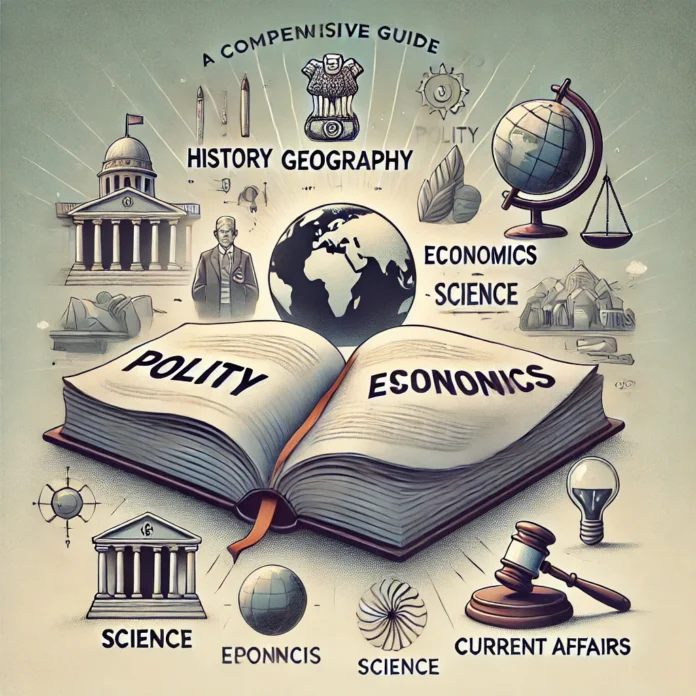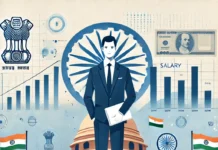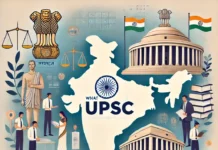Introduction
The Union Public Service Commission (UPSC) Civil Services Examination (CSE) is one of the most challenging competitive exams in India. A thorough understanding of the UPSC syllabus is crucial for effective preparation. In this blog post, we will break down the syllabus for both the Preliminary and Main examinations, providing detailed insights into each component.
UPSC Preliminary Examination Syllabus
The Preliminary Examination consists of two papers:
- General Studies Paper I (GS Paper I):
- Current events of national and international importance.
- History of India and the Indian National Movement.
- Indian and World Geography – Physical, Social, and Economic Geography of India and the World.
- Indian Polity and Governance – Constitution, Political System, Panchayati Raj, Public Policy, Rights Issues, etc.
- Economic and Social Development – Sustainable Development, Poverty, Inclusion, Demographics, Social Sector Initiatives, etc.
- General issues on Environmental Ecology, Biodiversity, and Climate Change.
- General Science.
- Civil Services Aptitude Test (CSAT) Paper II:
- Comprehension.
- Interpersonal skills, including communication skills.
- Logical reasoning and analytical ability.
- Decision-making and problem-solving.
- General mental ability.
- Basic numeracy (Class X level), Data interpretation (charts, graphs, tables, data sufficiency, etc. – Class X level).
UPSC Main Examination Syllabus
The Main Examination consists of nine papers, out of which two are qualifying in nature, and seven are counted for the final ranking.
- Paper A: Indian Language (Qualifying Paper):
- Comprehension of given passages.
- Precis writing.
- Usage and Vocabulary.
- Short essays.
- Translation from English to the Indian language and vice-versa.
- Paper B: English (Qualifying Paper):
- Comprehension of given passages.
- Precis writing.
- Usage and Vocabulary.
- Short essays.
- Essay Paper:
- Candidates are required to write essays on multiple topics.
- This paper assesses the candidate’s ability to articulate ideas and opinions in a coherent and logical manner.
- General Studies Papers I-IV:
- GS Paper I: Indian Heritage and Culture, History, and Geography of the World and Society.
- Indian culture – Art forms, literature, and architecture from ancient to modern times.
- Modern Indian history – Significant events, personalities, and issues.
- The Freedom Struggle – its various stages and contributors.
- Post-independence consolidation and reorganization within the country.
- History of the world – events, forms, and effects on society.
- Society – Indian society and its diversity, role of women, poverty, and developmental issues, etc.
- GS Paper II: Governance, Constitution, Polity, Social Justice, and International Relations.
- Indian Constitution – historical underpinnings, evolution, features, amendments, significant provisions, and basic structure.
- Functions and responsibilities of the Union and the States, challenges related to the federal structure, etc.
- Separation of powers, dispute redressal mechanisms, and institutions.
- Parliament and State legislatures – structure, functioning, conduct of business, powers & privileges, and issues.
- Structure, organization, and functioning of the Executive and Judiciary.
- Salient features of the Representation of People’s Act.
- Government policies and interventions for development in various sectors and issues arising out of their design and implementation.
- Welfare schemes for vulnerable sections of the population.
- GS Paper III: Technology, Economic Development, Bio-diversity, Environment, Security, and Disaster Management.
- Indian economy and issues related to planning, mobilization of resources, growth, development, and employment.
- Inclusive growth and issues arising from it.
- Government Budgeting.
- Major crops – cropping patterns, agricultural resources, and issues related to direct and indirect farm subsidies.
- Science and Technology developments, indigenization of technology, and developing new technology.
- Awareness in the fields of IT, Space, Computers, Robotics, Nano-technology, Bio-technology, and issues relating to intellectual property rights.
- Conservation, environmental pollution, and degradation, environmental impact assessment.
- Disaster management – various types and challenges.
- Linkages between development and the spread of extremism.
- GS Paper IV: Ethics, Integrity, and Aptitude.
- Ethics and Human Interface: Essence, determinants, and consequences of Ethics in human actions; dimensions of ethics; ethics in private and public relationships.
- Attitude: content, structure, function; its influence and relation with thought and behavior; moral and political attitudes; social influence and persuasion.
- Aptitude and foundational values for Civil Service, integrity, impartiality and non-partisanship, objectivity, dedication to public service, empathy, tolerance, and compassion towards the weaker sections.
- Emotional intelligence-concepts, and their utilities and application in administration and governance.
- Contributions of moral thinkers and philosophers from India and the world.
- Public/Civil service values and Ethics in Public administration: Status and problems; ethical concerns and dilemmas in government and private institutions; laws, rules, regulations, and conscience as sources of ethical guidance; accountability and ethical governance; strengthening of ethical and moral values in governance; ethical issues in international relations and funding; corporate governance.
- Probity in Governance: Concept of public service; Philosophical basis of governance and probity; Information sharing and transparency in government, Right to Information, Codes of Ethics, Codes of Conduct, Citizen’s Charters, Work culture, Quality of service delivery, Utilization of public funds, and challenges of corruption.
- GS Paper I: Indian Heritage and Culture, History, and Geography of the World and Society.
- Optional Subject Papers I & II:
- Candidates can choose any one subject from a list of optional subjects provided by UPSC. Each subject has two papers.
Personal Interview (Personality Test)
The final stage is the Personality Test, which assesses the candidate’s intellectual qualities, social traits, interest in current affairs, critical powers of assimilation, mental alertness, and moral integrity.
Conclusion
The UPSC syllabus is extensive and covers a wide range of topics across different subjects. A thorough understanding of the syllabus is essential for effective preparation. Candidates should approach each subject systematically and allocate sufficient time for each section to ensure comprehensive coverage. With dedication and the right strategy, aspirants can navigate the complexities of the UPSC syllabus and achieve success in this prestigious examination.




